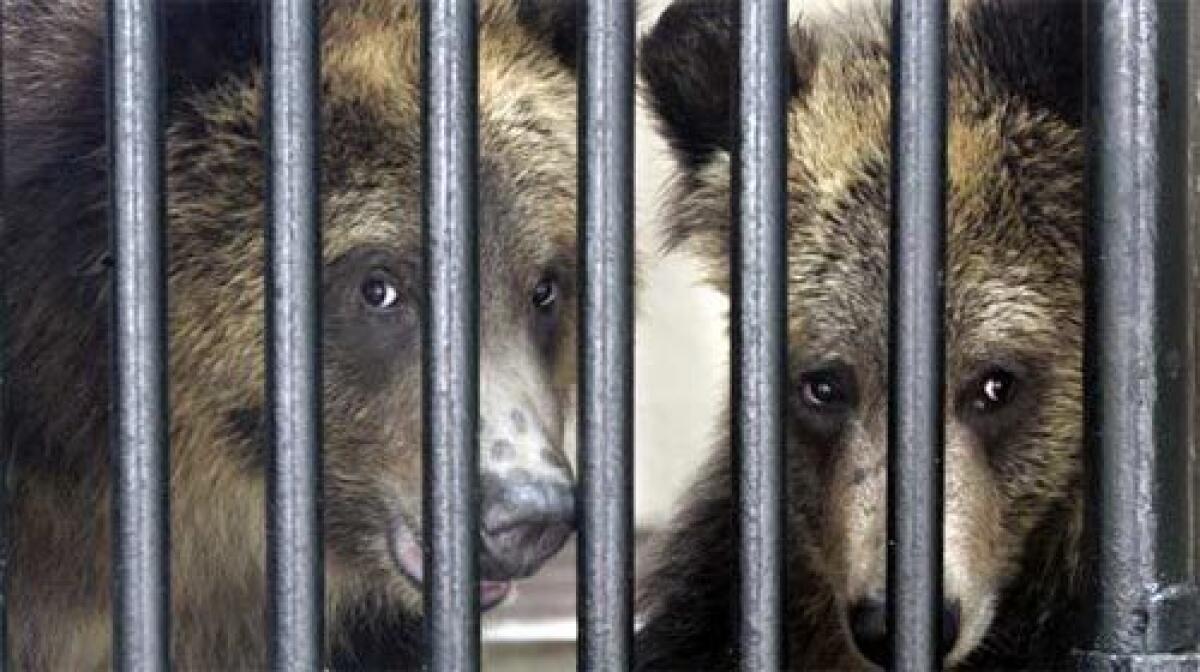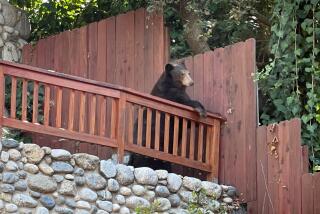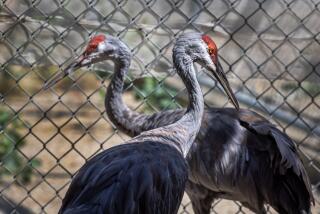More than the bear necessities for grizzly cubs

- Share via
SAN DIEGO — As the sons of a troubled parent, life has not been easy for Scout and Montana. Their mother just could not keep away from people and their trash.
And so when she broke into a -- thankfully -- unoccupied camping tent near Moose Creek, Idaho, authorities took action. In a two-day operation, the grizzly bear sow and her cubs were captured.
The mother was sent to the veterinary school at Washington State University to be watched and studied. But the school had no room for the cubs, each of which could grow to 1,000 pounds and 10 feet in length.
The brother bears were considered by officials to be unsuitable for return to the wild because their mother had taught them marauding habits that could set up a dangerous conflict with humans. They were kept temporarily at the Montana Wildlife Rehabilitation Center in Helena, which has 25 black bear cubs.
If no suitable permanent placement could be found, Idaho officials said the grizzly cubs might have to be euthanized.
Enter the San Diego Zoo, which, at least in recent decades, has had no grizzlies in residence.
The recent death of the Alaskan brown bear Spanky, a longtime favorite of zoo aficionados, had left a spare grotto in Bear Canyon. So zoo officials last month hired experts to crate the grizzly cubs and drive them by truck some 1,200 miles nonstop to San Diego. The drivers stayed in cellphone and text message contact with the bear’s future keepers to let them know they were traveling well.
Once at their new home, the 11-month-old twins, named Scout and Montana for now, were kept in medical isolation for six weeks. Scout in particular was watched closely because he had a broken jaw, repaired by surgery in Montana, that may have occurred during capture.
This week the animals were moved from the medical facilities to their new home in order to acclimate them to their “bedrooms,” indoor spaces where they will spend nights beyond the view of zoo visitors.
Today, they will make their public debut in their 4,500-square-foot grotto, with a moat, waterfalls, grass and various trees.
Zoo officials said the pair seem to get along well together, although there have been occasional tussles.
With particularly keen sense of smell, the bears communicate with a kind of low, growling, huffing sound that can often signal danger. Scout, despite his injury, is more active and curious and eager to interact with the keepers at feeding time; Montana is more reticent, letting Scout take the lead.
Two training sessions are held daily to teach the bears to come to the backstage cages for snacks of raw meat, grapes and a delicacy called “crushed omnivore meal” that includes peanut butter and honey. Each cub weighs about 150 pounds. At all times there are bars and other barriers between the bears and their keepers. By training the cubs to come to the bars and open their maws, keepers can check their teeth, eyes and other key spots.
Still, while they are careful around the bears, keepers say grizzlies in general have gotten a bad rap from stories about attacks in the wild. “Their first instinct is not to go after a human,” bear keeper Gaylene Thomas said.
As the grizzly population in portions of the Northwest continues to climb, interspecies conflicts are becoming more common, statistics show. The twins’ mother, for instance, was infamous in the Island Park region of eastern Idaho’s Caribou-Targhee National Forest.
Two summers ago she was captured and relocated. More incidents occurred, including raiding a trash compactor. Twice more she was relocated, and given a number so law enforcement and the Interagency Grizzly Bear Study Team could track her. The tent incident was the final straw.
Scout and Montana are temporary names given the cubs by San Diego Zoo bear keepers. Permanent names will be selected by one of the zoo’s benefactors -- a privilege bestowed occasionally in appreciation of financial support. They’ll have a tough act to follow. Spanky was long a favorite of zoo patrons.
“Guests still ask about him, they will for years,” said bear keeper Nicki Boyd.
Spanky was 23 and racked with cancer when he was euthanized in August. “We miss Spanky, but we’re glad to be able to take these guys in,” said Thomas.
More to Read
Sign up for Essential California
The most important California stories and recommendations in your inbox every morning.
You may occasionally receive promotional content from the Los Angeles Times.










